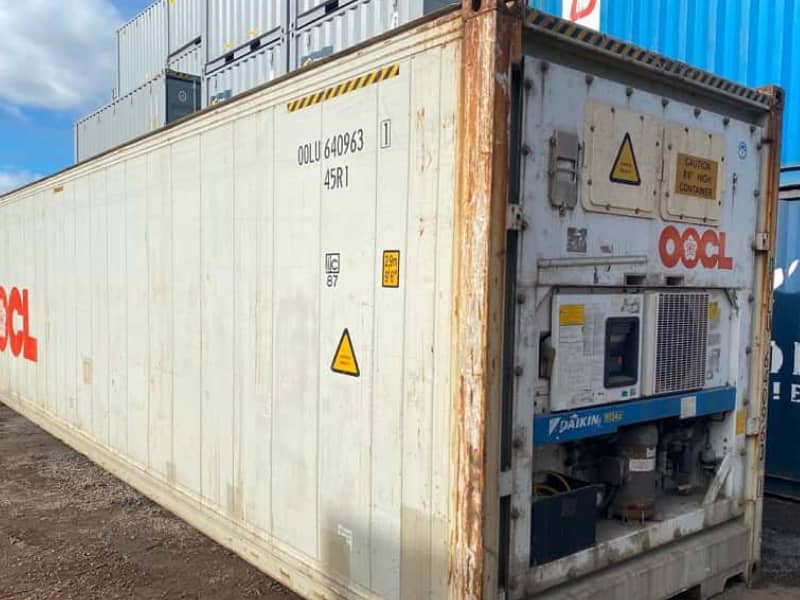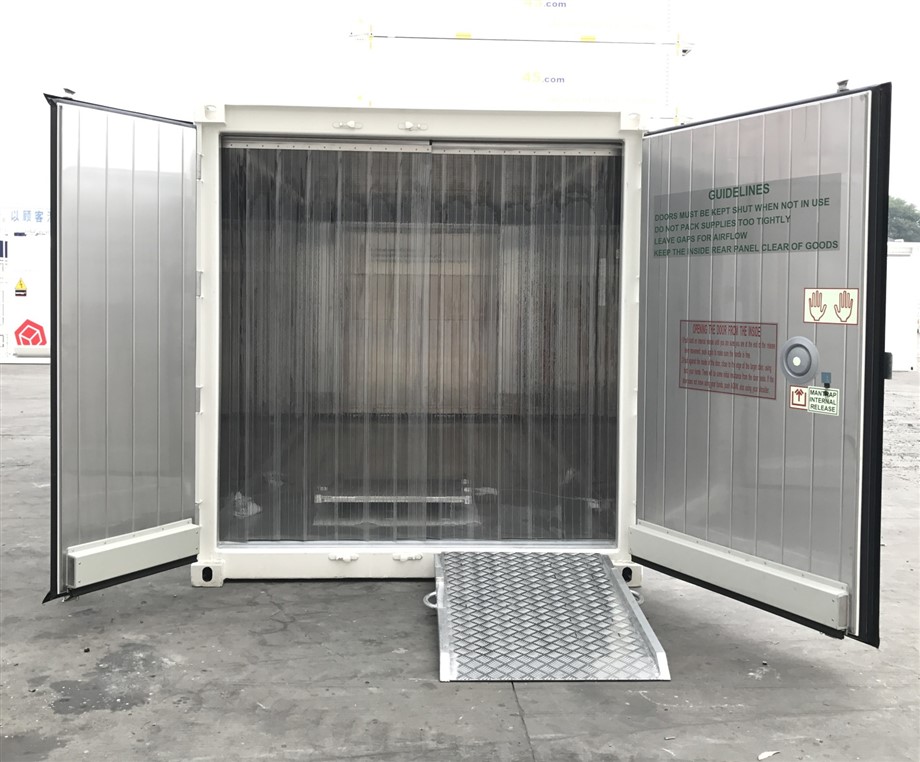Get the best deals on used 40ft cold storage containers for sale with trusted options
Everything About Freezer Containers: Vital Insights for Your Storage Space Requirements
Cold store containers play a crucial role in the conservation of perishable items. They come in different forms, including refrigerated and shielded devices, each designed for details storage space requirements. Recognizing the advantages and key features of these containers is crucial for services intending to enhance their procedures. As the demand for reliable storage remedies grows, exploring the various options readily available can lead to notified choices that impact both success and sustainability. What aspects should one consider when choosing the appropriate container?
Kinds Of Cold Store Containers
Cold store containers been available in numerous kinds, each made to fulfill specific temperature control needs. Among one of the most typical kinds are refrigerated containers, which preserve temperatures between 0 ° C to 10 ° C, making them appropriate for subject to spoiling goods like fruits, vegetables, and milk products. An additional type is the deep freezer container, which operates at temperature levels below -18 ° C, suitable for long-term storage space of icy items such as meats and seafood.
Shielded containers offer temperature level stability without energetic air conditioning, making them helpful for temporary transportation of temperature-sensitive items. Additionally, there are mobile cool storage space devices, which offer versatility in areas and are usually used in events or seasonal operations. Blast refrigerators swiftly lower the temperature level of hot foods, ensuring safety and security and high quality. Each type serves a special function in numerous sectors, from food solution to pharmaceuticals, stressing the importance of selecting the ideal container for specific storage demands.

Advantages of Using Cold Store Solutions

Cold storage space services extend the rack life of products, reducing waste and boosting productivity for organizations. By efficiently managing stock with correct temperature level control, firms can optimize their supply chains and improve operational efficiency.
Additionally, freezer centers enable adaptable storage choices, suiting various volume demands and seasonal changes popular (used 40ft refrigerated shipping containers). This adaptability helps organizations respond rapidly to market modifications
Finally, utilizing freezer options can ensure compliance with health and wellness laws, safeguarding both consumers and organizations. Overall, the calculated usage of chilly storage space boosts product management while advertising sustainability and economic viability.
Trick Attributes to Try To Find in Cold Storage Space Containers
When picking cold store containers, numerous crucial features benefit careful factor to consider to protect peak efficiency and reliability. Initially, temperature level control abilities are vital; containers ought to preserve constant temperatures suitable for specific items. Insulation top quality additionally plays a significant function, as superior insulation lowers energy consumption and boosts temperature stability.
Next off, convenience of gain access to and loading is essential; containers must use user-friendly layouts for efficient handling and organization. Resilience is an additional important facet; weather-resistant materials guarantee long life and guard contents against ecological elements.
Additionally, wheelchair features, such as built-in wheels or raising factors, assist in transport, while customizable layouts permit for tailored storage remedies.
Keeping an eye on systems, consisting of temperature level alarm systems and remote monitoring, give real-time updates, making specific that problems stay perfect. By focusing on these functions, individuals can pick chilly storage space containers that meet their operational needs effectively.
Choosing the Right Cold Storage Container for Your Requirements
Choosing the ideal cold store container calls for a thoughtful evaluation of operational needs and specific demands. Variables such as the sort of items being stored, temperature level sensitivity, and quantity ought to be focused on. For example, disposable food things might demand containers with rigid temperature level controls, while drugs might require accurate problems to maintain efficiency.
Additionally, possible individuals ought to consider the container's size and wheelchair. A bigger system may be needed for mass storage space, while smaller, portable alternatives might be optimal for momentary or on-site needs. Insulation top quality and energy effectiveness are additionally important, as these will impact operational prices and temperature stability.
Last but not least, conformity with sector laws and requirements is necessary, particularly in sectors like food and medical care. By carefully assessing these aspects, individuals can select a cold store container that effectively fulfills their special requirements and warranties ideal storage space conditions.
Best Practices for Keeping Freezer Issues
Preserving perfect cold store problems is vital for protecting the high quality and safety and security of temperature-sensitive products. Routinely monitoring temperature level and moisture levels is essential; utilizing reliable digital thermostats and hygrometers can offer exact readings. Proper insulation of cold storage space containers aids minimize temperature level changes and power loss.
Implementing a first-in, first-out (FIFO) system guarantees that older stock is utilized before more recent stock, minimizing waste (used 40ft refrigerated shipping containers). In addition, maintaining an arranged design within the storage room enables far better air movement and more info reduces the danger of cross-contamination
Regular upkeep checks on equipment, such as seals and compressors, are vital to avoid malfunctions. Personnel training on finest techniques for filling and dumping products helps maintain temperature stability. Maintaining doors shut as much as feasible restrictions warmth exchange, assuring that the chilly storage atmosphere remains stable and effective in maintaining beneficial items.
Expense Considerations for Freezer Solutions
When assessing cold store solutions, it is necessary to take into consideration the first investment costs alongside continuous operational expenses. A detailed malfunction of these expenses can reveal substantial lasting cost savings potential for services. Comprehending these financial facets assists stakeholders make informed choices regarding their cold storage space needs.

First Investment Costs
The financial landscape of freezer containers offers numerous first investment costs that companies should consider. These costs typically consist of the acquisition or rental cost of the containers, which can vary based on kind, size, and insulation high quality. Furthermore, costs connected to retrofitting existing frameworks to suit cold store should be factored in, particularly if specialized equipment is called for. Installment expenses, including electrical job and refrigeration systems, additionally add to the overall initial financial investment. Companies must not neglect transport expenses for providing containers to their preferred place. Lastly, possible customization alternatives, such as shelving or temperature level surveillance systems, can better influence the first financial expense. Cautious budgeting for these factors is essential for successful freezer execution.
Functional Expenditures Breakdown
Operational expenses for cold store services encompass numerous critical expense factors to consider that companies have to navigate. Secret variables include energy expenses, which can be significant due to the requirement to keep low temperatures. Upkeep expenditures are also substantial, as regular servicing is crucial to ensure devices runs efficiently and continues to be compliant with health and wellness and safety and security standards. Furthermore, labor costs might arise from the demand for specialized staff to keep track of the storage space and handle setting. Insurance costs are another factor to consider, as companies have to protect their financial investments against possible losses. Lastly, any kind of prospective governing compliance prices have to be factored in, as companies may require to spend in systems that stick to food safety and environmental guidelines. Understanding these expenses is vital for reliable budgeting.
Long-Term Savings Possible
Purchasing cold store options uses considerable long-term financial savings possibility, changing initial expenses right into monetary efficiency over time. By reducing spoilage and waste, businesses can boost their revenue margins considerably. Advanced insulation and energy-efficient systems lower utility costs, which gather over the life expectancy of the equipment. Chilly storage containers usually need much less frequent upkeep compared to standard refrigeration methods, leading to reduced repair costs. The ability to store items for extended durations without compromising top quality enables organizations to take advantage of on market fluctuations, enhancing revenue. In addition, the scalability of cold storage space options enables firms to adapt to transforming needs without sustaining excessive prices. On the whole, these variables add to a compelling situation for cold store as a cost-efficient financial investment strategy.
Regularly Asked Concerns
How Much Time Can Food Be Saved in Freezer Containers?
The period food can be saved in freezer containers differs by type. Usually, perishable items last from days to weeks, while icy foods can stay secure for months, relying on proper temperature and storage problems.
Are Freezer Containers Energy-Efficient?
The power efficiency of freezer containers differs based upon layout and insulation quality. Modern units usually utilize sophisticated technology to decrease energy consumption, inevitably contributing to decreased operational expenses and environmental impact in long-term use.
Can Cold Storage Containers Be Customized for Details Demands?
Cold store containers can indeed be tailored to fulfill details demands. Alterations might consist of temperature level controls, size modifications, and extra functions, enabling customers to tailor services efficiently for different storage demands and operational preferences.
What Are the Typical Dimensions of Cold Store Containers?
Freezer containers commonly are available in basic dimensions such as 10, 20, and 40 feet. These measurements accommodate various storage space demands, making certain versatility for businesses requiring temperature-controlled atmospheres for delicate materials or perishable goods.
Do Cold Store Containers Require Unique Authorizations for Usage?
Freezer containers often require unique authorizations for usage, depending on local laws and meant applications. Authorities might mandate authorizations to guarantee security criteria, ecological conformity, and correct operational practices are preserved during their usage.
Cold storage containers come in numerous types, each designed to fulfill particular temperature control requirements. Furthermore, cold storage space facilities permit for versatile storage space options, fitting numerous volume requirements and seasonal variations in demand. Selecting the appropriate cold storage container calls for a thoughtful assessment of certain demands and operational demands. The financial landscape of cold storage space containers offers different preliminary financial investment costs that services must consider. Cold storage containers can undoubtedly be customized to satisfy details needs.